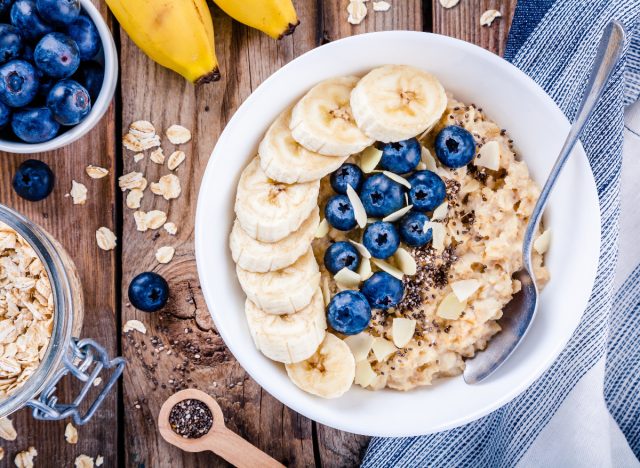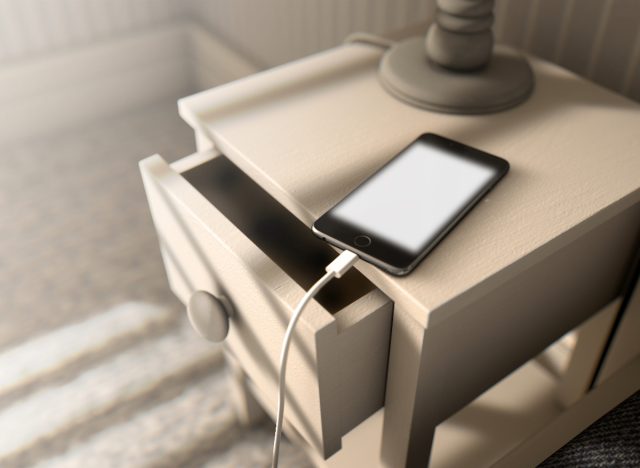10 Things You Should Do Every Morning for All-Day Energy

How many times do you start to fade out in the middle of your workday? Feeling tired presents a major issue when you haven't even wrapped up your meetings, deadlines, or workout routine at the end of the day—not to mention whatever obligations await you at home. Fear not, because we spoke with the experts and have you covered with the best morning habits for all-day energy. Get ready for an energy boost that will stay with you throughout the day!
There are so many things you may be doing that can totally zap your energy—and some of them may surprise you. Of course, perpetual feelings of exhaustion may be a warning sign of an underlying health condition that needs to be addressed by your doctor. But many lifestyle factors, including what you eat, how you sleep, and how much movement you get each day all play a major role in your energy levels.
If you're curious about how to feel more energized and vibrant, keep reading to see what the experts have to say about the best morning habits for all-day energy. And next, check out People Are 'Cricketing' Their Feet To Fall Asleep Faster—and Claim It Works.
Start each day with a nutritious breakfast.

Don't skip out on breakfast; it truly is your most important meal of the day! According to Lauren Manaker, MS, RDN, LD, CLEC, an award-winning registered dietitian, book author, and recipe developer who sits on our Medical Expert Board, "Starting your day with a balanced, nutritious breakfast is one of the best ways to ensure sustained energy throughout the day. Consuming a meal rich in protein, fiber, and healthy fats within the first two hours of waking up can kickstart your metabolism and provide a steady release of energy."
Hydrate first thing in the AM.

Manaker calls sufficient hydration a "cornerstone" of keeping your energy levels where they should be during the day. "Water is vital for virtually every bodily function, including the transport of nutrients and oxygen to cells, which subsequently supports metabolism and energy production," she explains. "Dehydration can lead to fatigue as bodily functions slow down to conserve water. Moreover, your brain is primarily composed of water, and even slight dehydration can impact cognitive function, mood, and concentration."
Cut back on caffeine.

We know what you're thinking right now: Caffeine gets you started in the morning. It's important to note that too much caffeine will do just the opposite of adding extra pep to your steps.
"Caffeine, primarily found in beverages like coffee and energy drinks, provides a quick but often short-lived energy boost," Manaker tells us. "This immediate surge occurs as caffeine stimulates the nervous system, resulting in increased alertness and reduced perception of fatigue. However, this effect is temporary and often followed by a 'crash', characterized by feelings of fatigue and lethargy. Over-reliance on caffeine can also lead to disturbances in sleep patterns, further exacerbating feelings of tiredness during the day."
When you're feeling thirsty, have more water! You can also try a DIY detox water if regular water is too boring for you.
Soak up some natural sunlight.

Good old natural vitamin D works wonders for your body, so be sure to get some fresh air and sunshine in the morning if you can. "The sunlight in the morning contains higher levels of blue light, which prompts our bodies to stop producing melatonin, the hormone that induces sleep. This helps us wake up and feel alert," Manaker explains. "Besides, our bodies use sunlight to help regulate our internal biological clock, or circadian rhythm. This rhythm affects our sleep and wakefulness patterns, digestion, and energy metabolism. Regular exposure to morning sunlight can help synchronize our internal clock, leading to improved sleep quality and energy levels during the daytime."
Exercise before you start your day.

Getting in regular physical activity plays a vital role in promoting solid energy levels during your day. So find exercises you enjoy, and kick your day off with them. Even a brisk morning walk works wonders.
"When we engage in physical activity, our bodies increase the production of endorphins, the 'feel-good' hormones, which help boost our mood and energy," Manaker says. "Additionally, exercise enhances blood flow, ensuring that oxygen and nutrients are efficiently delivered to our muscles and tissues, improving their function and endurance."
Avoid checking your phone when you wake up.

We all know how easy it is to wake up and reach for your phone to check emails and social media. But this is something Kelsey Decker, NSCA-CPT and manager of training for StretchLab, cautions against.
"I adapted this practice from Jay Shetty," Decker tells us. "He describes that looking at your phone first thing in the morning drains your energy toward others instead of using it for yourself. When I wake up, I put my phone in the living room while I take time to wash my face and get ready. This allows me about 30 minutes in the morning to wake up, have my own thoughts, and get my mind right for the day instead of being influenced by others or adding unneeded stress before the day begins."
Meditate.

A little bit of meditation in the morning can do a world of good for your day. "Stress and a busy mind can lead to feeling tired very quickly," Decker explains. "Taking three to 10 minutes in the morning to clear your mind, write out positive affirmations/focuses, or deep breathing exercises can help decrease the over-thinking and leave you feeling clear-headed."
Choose an outdoor spot or comfortable room in your home (preferably one that's filled with sunlight so you can kill two birds with one stone!), and make meditation part of your morning routine. Grab a pitcher of water to hydrate, and you'll be all set.
Listen to music.

Take it from The Doobie Brothers—"listen to the music!" Decker notes the importance of listening to some of your favorite tunes while you're going through your morning routine. She says, "There is nothing like a good playlist on your way to work to kick start your energy and positive mindset in the morning. Music can help decrease stress and increase your endorphins, setting yourself up for a great day."
Establish a healthy work-life balance.

Setting boundaries for yourself and keeping mornings and evenings for "you time" is an important component of an energy-filled, stress-free life. Let's face it: If you wake up first thing in the morning and start working before you even get to the office, you are bound to feel pretty exhausted long before lunchtime. Have your own relaxing routine before you start your workday, and try to end your workday at a reasonable time for your personal life as often as possible.
"I have a deep passion for my job, which can sometimes lead to overworking and exhaustion," Laura Blatterman, master trainer for Club Pilates explains. "To combat this, I've established a strict cutoff time in the evening. Once I reach my allotted work hours for the day, I close my computer and switch off my phone. Rest is a crucial component in maintaining sufficient energy levels."
Get your fill of protein.

If you can include protein-rich foods into your breakfast, such as Greek yogurt, eggs, chia seeds, turkey bacon, cottage cheese, pistachios, walnuts, low-fat cheese, protein powder, and peanut butter, you will be off to such an amazing start to each day. After working out, this is something Blatterman always carves out time for. "My preferred morning protein source is steak and eggs. However, when I'm short on time, I opt for eggs in a tortilla, which I can enjoy on the go," she says.









